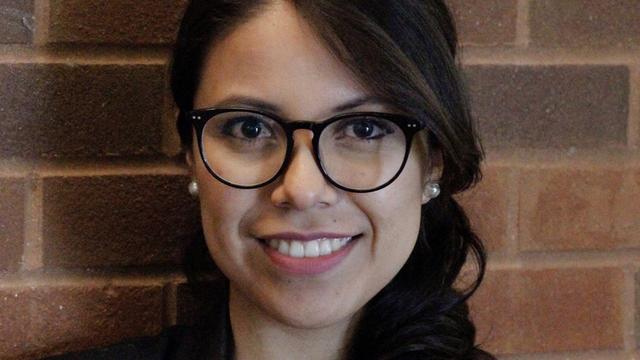the Advocates for Human Rights in Minneapolis.
A year after earning her Master of Human Rights from the University of Minnesota, Andrea Martinez is putting her experience to good use, assisting survivors of human trafficking in her position as a legal case manager at the Minneapolis-based Advocates for Human Rights.
While she was a student, Martinez was a research assistant in the University's Human Rights Organizations Project, and was a recipient of the Joseph E. Schwartzberg Workable World Trust Fellowship, which supports students who are committed to global governance.
Martinez also worked at the Mexican Ministry of Foreign Affairs on projects aimed at helping migrants under vulnerable conditions.
A native of Mexico City, Martinez earned her bachelor’s degree in political science and international relations from the Center for Research and Teaching in Economics in Mexico City.
We asked Martinez how her educational experiences affected her professional and personal growth.
Tell us about your current job.
I began working as the human trafficking legal case manager at The Advocates for Human Rights in June of 2018. I do direct screening of potential clients (by clients, I mean survivors of human trafficking). Then, if the organization has the capacity and resources to take the case, I assist in the file preparation for placement with volunteer attorneys. I also follow up on clients and gather data related to legal casework.
I initiated an outreach strategy with the Latino community to increase awareness about human trafficking. We are focusing on youth because, on the one hand, they can be more vulnerable to trafficking, but also their empowerment is key to prevention in the community.
The experience has been fulfilling, but in the beginning it was emotionally exhausting, in a good way. It is hard listening to people’s stories about how they have been exploited and abused, but also it is rewarding to do as much as you can to assist them.
Describe your experiences studying human rights here at the University.
This journey, which started when I came here to Minnesota in 2016, has been transformative. During my second day of school, a very secure and persuasive student asked me if I had already joined the Humphrey Students of Color Association. I hesitated for a moment and then asked her: “What does it mean, being a student of color?” She said, “If you are not white, then you are a student of color.” It seemed pretty simple, so I looked at my skin, and I thought, “Yeah, I guess I am a student of color.” What I mean is that my identity changed.
I was born and raised in Mexico City, and before coming here I had never questioned my identity. I was Andrea, a Mexican citizen, and I would study for my master’s degree and then go back home to apply everything I learned. For personal reasons, I decided I wanted to stay a little bit longer. Then, my accent, the color of my skin, my ID, and my personal experiences became more important in my new context.
Here, I am an immigrant. I am not only Mexican but Latina, a person of color, part of a minority group.
Why did you decide to pursue human rights work?
The work that I do at The Advocates has given me the opportunity to reflect not only about my identity as an immigrant, but also about my privileges. I am part of the privileged group of immigrants that came here by choice. I was not running away from anything.
I have had access to high-quality education, and I have documents that allow me to work and live a comfortable life, without being afraid of being separated from my family. Most of the clients at The Advocates don’t have those privileges, and this reality has motivated me to try to have a positive impact on their lives with the resources that this job provides to me.
What did you take away from your time at the Humphrey School?
I learned a lot from my classmates at the Humphrey School. I am grateful for the opportunity to talk to people from different backgrounds and cultures. This rich exchange of ideas sometimes was informal; for example, as an international student, it was fun to talk to other international students about our cultural shocks. However, other times, the discussions were more academic.
I appreciate the opportunity I had to hear about human rights conditions in other countries from smart and talented people who were also part of the program. This experience humbled me and made my perspective on human rights issues broader.
The Master of Human Rights program is jointly supported by the Humphrey School of Public Affairs and the College of Liberal Arts (CLA). This story was originally published by the CLA's Human Rights Program.


